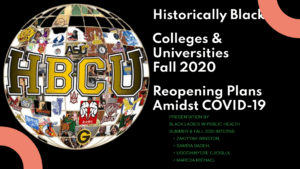
This study examines the Fall 2020 reopening plans amidst the COVID-19 pandemic for 101 HBCU’s in the United States.
Significance and Results: Fall 2020 reopening plans were identified by reviewing official statements from the institution administration on their official website. A conventional content analysis was conducted to code themes presented in the documentation by (1) organizing campus COVID-19 policies, innovations, accommodations, resources, and semester scheduling; and (2) assessing relationships between COVID-19 specific plans and school-based factors, student factors, environmental factors, and COVID-19 impact. Using R, descriptive statistics were employed to examine sociodemographic characteristics. Fisher’s Exact Tests were used to evaluate differences between HBCU’s based on the primary method of instruction: in-person, online, or hybrid.
Statistically significant differences were found among HBCU’s based on instruction offered (in-person, online, or hybrid) with respect to school type, cost of attendance, location, and graduation rates. Program length, student population size, and number of degrees offered were not statistically significantly different. The result of this study is provided in context of the strong emergence of COVID-19, the disparate impact on Black communities, and the response of HBCU’s charged with continuing their legacy of safety and service to the Black community within the United States.